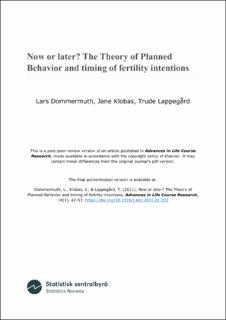Now or later? The Theory of Planned Behavior and timing of fertility intentions
Peer reviewed, Journal article
Accepted version
Permanent lenke
https://hdl.handle.net/11250/2641642Utgivelsesdato
2011-01-20Metadata
Vis full innførselSamlinger
Originalversjon
Dommermuth, L., Klobas, J., & Lappegård, T. (2011). Now or later? The Theory of Planned Behavior and timing of fertility intentions. Advances in Life Course Research, 16(1), 42-53. https://doi.org/10.1016/j.alcr.2011.01.002Sammendrag
This article focuses on the time frame of intentions to have a child. For both parents and childless people we compare those who want a child now with those who intend to have a child within the next three years. Based on the Theory of Planned Behavior and using data from Norway (N = 1307), we investigate the role of attitudes, subjective norms and perceived behavioural control on these two different time frames in fertility intention. The results show that subjective norms have a significant effect on the timing of intentions to have a child for both childless people and parents: the more both groups feel that their intention to have a child is supported by their families and friends, the more likely they are to want a child now compared to within the next three years. It also shows that positive attitudes have a significant effect on intending to have a child now rather than later for parents but not for childless people. Perceived behavioural control is a significant determinant for both groups: people who consider themselves better able to cope with having child are more likely to intend to have a child now rather than within the next three years. But this effect disappears when we control for demographic background variables, suggesting that the effect of perceived control on the timing of having a child varies considerably with personal circumstances.

